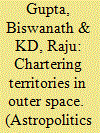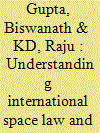|
|
|
Sort Order |
|
|
|
Items / Page
|
|
|
|
|
|
|
| Srl | Item |
| 1 |
ID:
158354


|
|
|
|
|
| Summary/Abstract |
Space research is heralded as the harbinger of the next level of advancement in science and technology. The fact that countries are spending millions of dollars in this regard is testament to its potential. India is making inroads in the field and, in the last 15 years, has established itself as a dominant player. According to Antrix, the commercial wing of the Indian Space Research Organization, India commercially launched 209 foreign satellites of other countries into space. Apart from this, Antrix is applying its success in other commercial activities, like remote sensing, selling of space objects (parts of satellites and launching vehicles), and mission support. In keeping with this development, the Indian legal position and policy framework with respect to commercial space activities are reviewed. The article also surveys India’s commitment to international space law and its reflection in national legislation. Finally, the existing policy related to commercial space in India is examined and measures are suggested to create national legislation for the country to deal with issues of commercial space activities.
|
|
|
|
|
|
|
|
|
|
|
|
|
|
|
|
| 2 |
ID:
148497


|
|
|
|
|
| Summary/Abstract |
For the last 50 years, Indian Space Research Organisation (ISRO) has seen a tremendous development in the field of space science and technology. Outer space exploration in social programme (education, telemedicine, communication and information) and economic activities (agricultural forecasting, meteorological data, telecommunication and broadcasting) helped India grow faster. Over the past few years, India is also engaging with other countries, offering them the space science and technology for their overall development.
|
|
|
|
|
|
|
|
|
|
|
|
|
|
|
|
| 3 |
ID:
170637


|
|
|
|
|
| Summary/Abstract |
The status and liability of non-governmental entities for commercial use of outer space activities on behalf of space launching states are not very clear under the existing space law regimes. Non-governmental entities are those who carry private space activities such as commercial launching, supplying different equipment or parts to space agencies and manufacturing spacecraft and satellite. The possible litigation relating to the commercial activities are mainly the financial consequence of damage caused and also the technical complications that private entities face in case of supply of defaulted parts to the space agencies. According to Article VI of the Outer Space Treaty 1967 and Articles II and III of Liability Convention 1972, launching country is liable for any activities in outer space. Even in the case of non-governmental activities, the launching state is liable. Therefore, in the event of any commercial activity from any sovereign states, the state is liable for any accidents and consequential damages.
This article focusses on specific issues such as liability for commercial outer space activities of nongovernmental entities in the existing international space law regimes. It explores the applicable principle of space law and international law in outer space activities. The work also focusses on the impact on space liability regime as well as on the legal efficiency of the links between private entities and state liability. This exercise is important in the background of the increasing number of private spacecrafts scheduled for launching in the future.
|
|
|
|
|
|
|
|
|
|
|
|
|
|
|
|
|
|
|
|
|